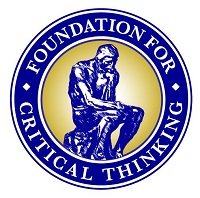Please do not pass this message by.
CRITICAL THINKING IS AT RISK.
Here are some of the big reasons why:
- Many people believe that critical thinking should be free and that scholars qualified to teach critical thinking should do so for free. Accordingly, they do not think they should have to pay for critical thinking textbooks, courses, or other resources when there is "so much free material online" - despite how erroneous that material may be.
- There are many misguided academicians, and some outright charlatans, pushing forth and capitalizing on a pseudo-, partial, or otherwise impoverished concept of critical thinking.
- Little to no funding is designated for critical thinking professional development in schools, colleges, or universities, despite the lip service widely given to critical thinking (as is frequently found in mission statements).
- Most people, including faculty, think they already know what critical thinking is, despite how few have studied it to any significant degree, and despite how few can articulate a coherent, accurate, and sufficiently deep explanation of it.
- People rarely exhibit the necessary level of discipline to study and use critical thinking for reaching higher levels of self-actualization. In part, this is due to wasting intellectual and emotional energy on fruitless electronic entertainment designed to be addictive and profitable rather than educational and uplifting.
- On the whole, fairminded critical thinking is neither understood, fostered, nor valued in educational institutions or societies.
- People are increasingly able to cluster themselves with others of like mind through alluring internet platforms that enable them to validate one another's thinking - even when their reasoning is nonsensical, lopsided, prejudiced, or even dangerous.
- Critical thinking does not yet hold an independent place in academia. Instead, "critical thinking" is continually being "defined" and redefined according to any academic area or instructor that, claiming (frequently unsupported) expertise, steps forward to teach it.
As you see, increasingly powerful trends against the teaching, learning, and practice of critical thinking entail extraordinary challenges to our mission. To continue our work, we must now rely upon your financial support. If critical thinking matters to you, please click here to contribute what you can today.
WE NEED YOUR HELP TO CONTINUE OUR WORK.
Thank you for your support of ethical critical thinking.
Hide
